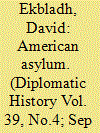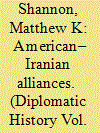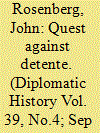|
|
|
Sort Order |
|
|
|
Items / Page
|
|
|
|
|
|
|
| Srl | Item |
| 1 |
ID:
140745


|
|
|
|
|
| Summary/Abstract |
In 1939–1940, internationalists, with the approval of the Roosevelt administration, campaigned to transplant key technical organs of the League of Nations to the United States to aid in postwar planning and prevent fascist forces in Europe from co-opting the institution.
|
|
|
|
|
|
|
|
|
|
|
|
|
|
|
|
| 2 |
ID:
140746


|
|
|
|
|
| Summary/Abstract |
The tension between “modernization” and “rights” defined the relationship between Americans and Iranians from the 1950s through the 1970s. The dynamic interplay between these two transnational currents is best understood through the lens of international education. U.S. policy makers envisaged Western-educated Iranians as the bastion of pro-Americanism required to provide the cultural underpinnings of the Washington–Tehran alliance. But the influx of Iranian students to American campuses globalized U.S. institutions of higher education and, in the process, produced an alternate alliance of Iranian youths and progressive Americans that rejected Shah Mohammad Reza Pahlavi’s authoritarian model of development, called for the realization of human rights in Iran, and revealed the contradictions inherent in a U.S. strategy that promoted student exchange while at the same time supporting the shah as an agent of modernization and anti-Communism.
|
|
|
|
|
|
|
|
|
|
|
|
|
|
|
|
| 3 |
ID:
140744


|
|
|
|
|
| Summary/Abstract |
Recent historical work has illustrated the importance of the Philippine-American War in the twentieth-century formation of American empire. These studies, however, tend to efface important tensions between political and economic forms of imperialism, seeing capital as merely another instrument of sovereign rule. In response, this article illustrates that wartime imperial encounters in the colonial Philippines from 1898 to 1903 troubled the capacity of American empire to hold authority over the disorder caused by a seemingly autonomous capitalist market. Indeed, the market appeared to the military colonial government as a force that could not only limit American authority, but could also upturn racial and labor hierarchies. Tensions over the market surfaced especially in and through: the fiscal policies of the occupying military government, the mundane daily interactions between Americans and local retailers in the cities, suspicions over foreign banks, and the disbursement of wages to soldiers. As a response to this threatening political and economic disorder, one of the first steps of the American colonial state was to employ publically renowned financial expert, Charles Conant, to institute a new Philippine currency system. Racial capacities of colonial subjects—both ethnically Chinese and “native” Filipinos—to understand the truths of the capitalist market and obey colonial authority consequently shaped Conant’s design for a new currency system.
|
|
|
|
|
|
|
|
|
|
|
|
|
|
|
|
| 4 |
ID:
140749


|
|
|
|
|
| Summary/Abstract |
The conventional view of Lend-Lease holds that the program provided little aid to Britain in 1941, was inefficiently administered, and lacked support in the U.S. military. An examination of the repairs performed on British warships in U.S. shipyards in 1941 under Lend-Lease demonstrates that these repairs materially contributed to the Royal Navy’s ability to sustain the global war at sea. Repair work in American shipyards played a significant role in ending a growing repair crisis within the Royal Navy. Furthermore, careful bureaucratic coordination between the two navies maximized the impact of American repair work. The repair work was accelerated by the U.S. Navy’s diversion of industrial resources from American shipbuilding to repair British warships.
|
|
|
|
|
|
|
|
|
|
|
|
|
|
|
|
| 5 |
ID:
140748


|
|
|
|
|
| Summary/Abstract |
This article argues that the October War of 1973 between Egypt, Syria, and Israel had a profound impact on the right wing campaign against détente in the United States. It focuses on Eugene Rostow’s leading role in the anti-détente movement of the 1970s, revealing how Rostow, who had previously supported détente, interpreted the October War as a Soviet plot to destroy Israel and separate Europe from the United States. Henry Kissinger and Richard Nixon, he concluded, were deceiving the American people to maintain the “myth” of détente. Race profoundly influenced Rostow’s reasoning. He rendered Arab peoples irrational, emotional, and childlike, wholly under the control of Soviet leaders. Rostow launched what one historian has referred to as the “first head-on assault of détente,” through his leadership of the Coalition for a Democratic Majority and later his founding of the Committee on the Present Danger. While the article highlights the conflicting views between Rostow and Kissinger, it emphasizes that the two men shared a Cold War worldview.
|
|
|
|
|
|
|
|
|
|
|
|
|
|
|
|
| 6 |
ID:
140747


|
|
|
|
|
| Summary/Abstract |
After Ríos Montt, an evangelical Christian, seized power in Guatemala in a 1982 military coup, U.S. evangelical missionaries and parachurch organizations supported his regime through public outreach, fundraising, and congressional lobbying. Despite mounting evidence that Ríos Montt’s campaign against Guatemala’s “communist insurgency” involved the mass killing of indigenous Mayans, conservative evangelical groups in the United States argued that the dictator’s Christian faith would compel him to improve the country’s human rights situation. This essay explores the theological beliefs underpinning evangelical support for Ríos Montt and contends that backing from U.S. and Guatemalan evangelicals for his regime and for Reagan administration’s efforts to extend military aid to Guatemala became significant factors shaping relations between the two countries. By placing evangelical involvement in Guatemala in an international context as part of a global evangelistic campaign, this essay reveals how religious nonstate actors shaped U.S. relations with Central America in this period.
|
|
|
|
|
|
|
|
|
|
|
|
|
|
|
|
|
|
|
|
|